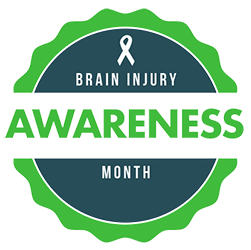March is Brain Injury Awareness Month making it a great time to review the basics. A brain injury in a child can range from mild to severe. A mild brain injury is called a concussion.

The signs and symptoms of a concussion can include:
- Loss of consciousness (usually brief, for seconds to minutes)
- Confusion or feeling dazed or "not right"
- Memory loss
- Trouble answering questions properly
- Responding slowly
- Balance problems
- Dizziness
- Headache
- Nausea or vomiting
- Light sensitivity
- Change in mood or behavior
Symptoms typically will present soon after the head injury, but sometimes you may not be sure if it’s a brain injury right away and symptoms of the concussion can show up hours to days later.
If your child has a head injury, it’s important to watch for any signs and symptoms over the next few days. If your child plays sports, you should remove them from play immediately after a head injury and do not have them return to the activity until you know for sure that your child has not experienced a concussion or more serious injury.
Signs of a more serious injury that require immediate attention in the emergency room and likely require head imaging (CT scan) can include:
- Continuous drowsiness or inability to wake up
- Repetitive vomiting
- A headache that is progressively worsening
- Convulsions or seizures
- Slurred speech or repeating oneself over and over
- Decreased coordination or falling that is not improving
- Worsening confusion or change in behavior
- In an infant or toddler - crying inconsolably or not eating
A CT scan is not used to diagnose a concussion, but is done to rule out something more serious like a skull fracture, brain bleed or bruise. It is usually done in the setting of the emergency room and the emergency room doctor will determine at the time of the assessment if imaging is necessary. A CT scan is less helpful outside of this setting.
If you have any concerns about your child’s head injury at all, it’s important to have them see a pediatrician for evaluation as soon as possible. Your pediatrician can then determine if immediate attention is necessary such as going to the emergency room, head imaging or referral to a specialist.
Most symptoms after an injury will start to subside after a week; however, a referral to a specialist is often needed if symptoms are not getting better. At Barrow Neurological Institute at Phoenix Children's, we have a Concussion Clinic for young patients who have experienced a recent concussion, with specialists from Neurology, Neurosurgery and Sports Medicine.

